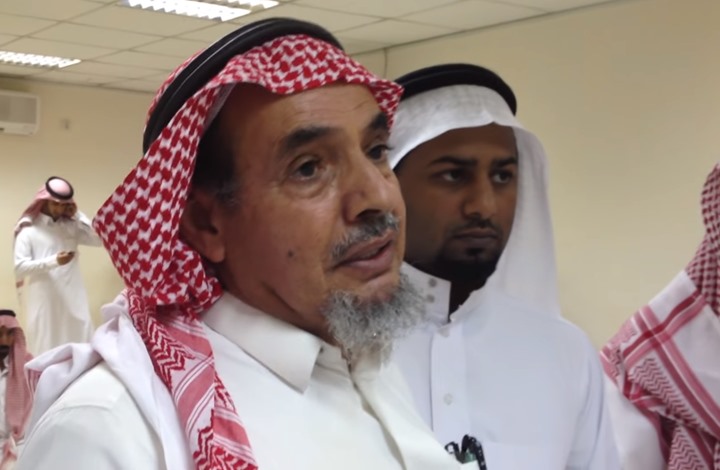
On 24 April 2020, the human rights defender Dr. Abdullah Al-Hamid died in hospital, after suffering from medical negligence in detention. Al-Hamid is one of the most prominent founders of the Civil and Political Rights Association, Hasm, who was arrested several times because of his human rights activities and his demands for reform. In September 2018, Al-Hamid won, in partnership with his colleague Dr. Muhammad Al-Qahtani and the activist Walid Abu Al-Khair, the Wright LevelHood Prize, known as the “Alternative Nobel Prize”. In March 2020, he won, in partnership with his colleagues, the most prominent human rights prize in the Netherlands known as the Khosen Binning.
Information indicates that Al-Hamid (born 12 July 1950) was transferred from Al-Ha’ir prison in Riyadh, where he has been detained since 2013, to intensive care on 9 April 2020, after he suffered a stroke and entered into a coma. According to Al-Qast Organization, Al-Hamid had been suffering from deteriorating health, for which he was transferred to the hospital more than three months ago. A doctor at the time informed him at the time of his urgent need for catheterization.
Despite this, the Saudi authorities returned him to prison in difficult health conditions and subjected him to psychological pressure, as he was prevented from communicating and visiting with his family several times. He was additionally denied the ability to inform his family or anyone abroad about his health.
Al-Hamid was arrested in March 2013, after which he was sentenced to 11 years’ imprisonment and 11 years of travel ban, on charges including participating in founding an unlicensed association, seeking to “undermine state policies”, “providing false information about Saudi Arabia”, and “inciting International organizations over the Kingdom” and “participating in an unlicensed association ”.
The European Saudi Organization for Human Rights has documented the violations suffered by al-Hamid since his arrest. From the beginning, he suffered from poor prison conditions in Al-Ha’ir prison in Riyadh, as the Saudi authorities transferred him to an area in the prison where smoking is permitted – a fact which constituted a threat to his health life due to his poor health.He additionally experienced significant abuse while in prison, including the confiscation of his books and personal belongings, which led to his announcement on a hunger strike in March 2014 to demand better food and healthcare in the prison. This would be the first of many such strikes.
ESOHR, concerned with the spread of the Covid 19 virus worldwide and fears of unhealthy conditions in Saudi prisons, recently stressed the importance of the release of Dr. Al-Hamid and other prisoners of opinion, especially the elderly. ESOHR also previously indicated on World Awareness Day About the Treatment of the Elderly that the Saudi government has been abusing “older generations and subjecting them to suffering”, including Al-Hamid, age 69 prior to his death, through arbitrary arrests, medical neglect and torture. Saudi Arabia has not responded to any of these appeals.
Al-Hamid’s case had received significant attention from the United Nations human rights mechanisms. Working Group on Arbitrary Detention sent a message to the Saudi government in September 2014 in which it confirmed that Al-Hamid’s arrest was arbitrary and that the crimes he was convicted of with eight other activists were protected behaviours under international law.
In November 2015, the Working Group published its opinion on the issue of nine activists who were arrested in connection with their human rights activities and expressing political opinions: Suleiman al-Rashoudi, Abdullah al-Hamid, Muhammad al-Qahtani, Abdul Karim al-Khader, Muhammad al-Bajadi, Omar al-Saeed, Raef Badawi, Walid Abu al-Khair, Fadel al-Manasif. After the government responded, the Working Group confirmed that the nine detainees were subjected to arbitrary detention, and that their release would be the primary remedy.
In a public statement in November 2016, the Working Group and a number of Special Rapporteurs demanded that Saudi Arabia release Al-Hamid and other activists, stressing that their continued detention was in violation of international human rights standards.
ESOHR believes that the death of Abdullah al-Hamid in the hospital came about as a result ofdeliberate neglect for his health that he suffered during the years of his detention, and that the Saudi government was even up to his last moments intransigent in its refusal to to release him, although he was arbitrarily detained and despite his age and his critical health condition. ESOHR considers that this death requires immediate and urgent accountability of all officials directly or indirectly involved in both his ill-treatment and unfair judicial rulings.
ESOHR stresses that what the behavior that led to al-Hamid’s death has been repeated with other activists and human rights defenders who are detained because of their peaceful political activities. Saudi prisons are overcrowded with political detainees, especially since the Saudi government’s adoption of a policy to silence all critical voices. Many of those persons areelderly, including several women,and in dire need of medical attention.
In addition to targeting Dr. Al-Hamid within the general targeting of the Civil and Political Rights Association, Saudi Arabia has launched successive campaigns against reformers, human rights defenders, and all organisations that have demanded respect for human rights that have been established in the past two decades. It is still detaining the founder of the Federation of Human Rights, Muhammad al-Otaibi. In addition, Walid Abu al-Khair and Samar Badawi, who themselves established the Human Rights Observatory in Saudi Arabia, are still detained.Additionally, Fadil Al-Manasif, who was sentenced to 15 years in prison, and lawyer Taha Al-Hajji, who was threatened with arrest prior to fleeing the country in exile, were targeted for their founding and work in the Center for Justice for Human Rights.
ESOHR confirms that Abdullah al-Hamid is a victim of repression first, neglect and mistreatment second, and considers that his death warns of the importance of reviving the cases of all human rights defenders, activists, and detained people of opinion injustice in poor conditions. Working to release them must be a priority, and is indispensable for the continuous pursuit of accountability.
